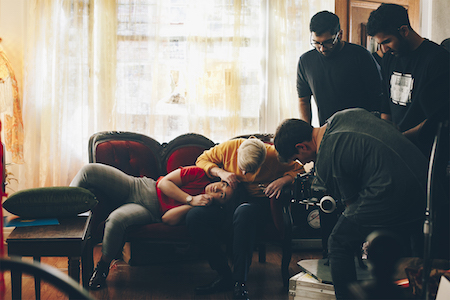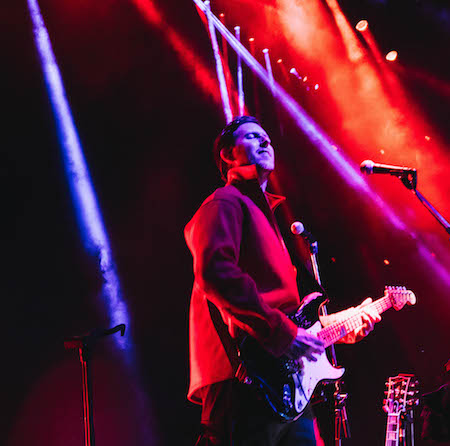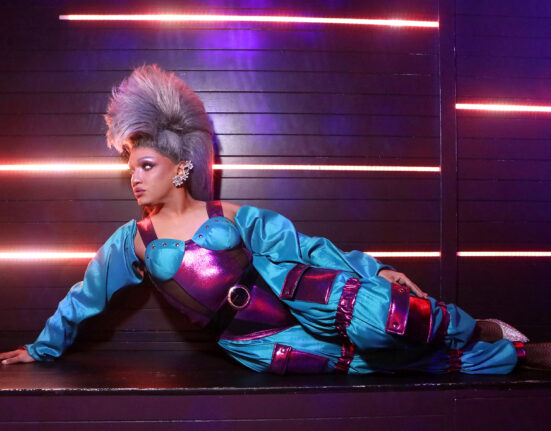Sincere congratulations to Jesse Carmichael, keyboardist/rhythm guitarist for for one of music’s longest-surviving and most popular bands on the planet, Maroon 5, on his haunting and powerful two-minute film, “Thrive.”
In the most compelling and intriguing fashion, the film focuses on bringing awareness to the struggle for equality, the obstacles of intolerance and the bullying and violence suffered by the LGBTQIA community. In only two short minutes, the film voices and conveys in the most titanic fashion a heartfelt myriad of emotion, empathy and understanding of the plight of the gay community.
Carmichael is the founder of 2mm (@2minutemovies on Instagram), a short film collaborate collective. “Thrive” was directed by brothers Shivin and Sunny and was produced by Nupur Mehrotra. Carmichael put the film to music and became the executive producer. The film starred Kai Wes, Jewel Sales, Sage Nicole Chavis, Madisyn Maniff, Alex Ryan and Jacob Chabon.
I had the extreme pleasure of speaking with Carmichael in the midst of Maroon 5’s tour of Asia. A very spiritual and enchanting soul (an obvious reflection on the film), he revealed the inspiration and the essence behind this riveting and vibrant film.
He described Bangkok as an awesome and vibrant city, and then suggested I visit it along with Singapore and Japan. After I told him I lived on Long Island, he confessed that he and “the singer” of Maroon 5 had gone to Five Towns College to study music for a semester.

I have to ask you the obvious question: What inspired the film, which, by the way, is almost haunting?
I’m glad to hear you say that. I like to hear things like haunting and mysterious, because I’ve been thinking for a long time now about the whole idea of how to share with people something that’s in the creative realm that doesn’t feel like it’s preachy, especially when there is a definite agenda behind it, which is trying to open people’s mind as to the importance of acceptance for other lifestyles and other cultures and other races—all of the things that are happening today in terms of intolerance rearing its head. I like the idea that those kinds of things can be addressed in a medium like film in a way that isn’t a direct, preaching thing. It’s funny, I guess, because we are using a sample from a sermon from Martin Luther King in the film. I certainly do appreciate his preaching.
I thought that was kind of cool, though.
It was from an obscure speech, too, that I found online. I liked his poetic word choices at the end in terms of his own biblical language under our own fig and vine tree. It is interesting. So yeah, I’m glad that you enjoyed it. It came about because I recently started a collaborative film collective called “2 Minute Movies,” which was shortened with the abbreviation 2mm, which is kind of a reference to film stock. The only rule of this collective is that each piece that we make has to be under two minutes. I wanted to see how it would sort of evolve naturally, so I put up a few things with some friends that I made online and then through a social media network called Mixer. I met the directors of this film, Shivin and Sunny, who are two brothers from India, which is another interesting ripple in the story given what has been going on culturally in India that I just sort of caught bits and pieces of in terms of gay marriage, rights and hearing things about that culture in general, in terms of how tolerant it is. I am hoping that things are moving in a more and more equanimous and loving, tolerant and open direction in that country. They reached out to me with an idea about doing some sort of film in the realm of trying to open people’s eyes to the violence that people in [the] LGBTQIA+ etc. [community] experience. I think we should shorten it to just the plus. Maybe we should just shorten it to nothing, no label. We will get there.

I’m interested that you focused on a gay theme.
We are actively searching for places that would be interested in helping to put out this film, because we want to get the word out as much as possible. I mean, this is what I’m really excited to do with my time right now, outside of my band, is working on film stuff, because I love film so much. I think it is such a powerful media. People can have such visceral experiences with even a short film like this. You know, the emotions can come out quickly. I don’t know how many times I have looked at a Thai long-distance phone commercial. The heart strings are so easily tugged upon with a combination of images and music.
I’ve been writing for Get Out! for nine years now, a gay themed publication, and have come across many different films on the subject; however, in the two minutes that I watched your film, it actually said a lot more in the two minutes than many of the other, longer films. Who wrote it?
Sunny and Shivin, the brothers, came up with the concepts for the “safe house” setting with the flashbacks to the traumatic experiences that people meeting up kind of purged themselves with these experiences that they had gone through. When they shot it, they started to edit it and sent it to me, and I wrote the music to it and put that quote in at the end.
Well, the music was awesome, and the entire film was really affecting. Where do you even find the time to do these films. I mean, don’t you tour constantly?
Yeah, we are constantly touring. I’ve got a new family that I’ve just started with my fiancé. We have a seven-month-old baby, and it’s so fun. So I’m excited to get home from this tour more than ever and to get back into the family mode.
Aside from this film, what other films have you done, and have they also been created to raise some kind of awareness?
I’m happy with a couple of the 2mm films that we’ve made in addition to this one. They are all up on the YouTube page and the Instagram page for 2mm. I did an animated film with a voiceover actress friend of mine and an animator that I found on Instagram, who I asked to collaborate with us. I wrote the script for this metaphoric idea that I have of the world being like a big party and all the rooms are different. Some rooms have better food and drink than other rooms. A lot of our party rooms are really great, but we can hear from down the hallway screams of some people that are in a room which is actually on fire. We don’t really want to do anything about it, because our party is so fun, but maybe someday that fire is going to spread down the hallway into our party room, so maybe we should do something about it. I like the way the voiceover goes in such a fast tempo. You don’t really get a chance to understand what you’re hearing until it’s over, and then you realize, “Wow that’s kind of interesting.” It kind of goes along with the fact that I don’t like the idea of people being directly preachy with an idea of how they think the world can be a better place. But if people have ideas about it, and they want to try and kind of subtly put them into art, that makes people kind of feel good when they’re watching it, or feel something, or think something that’s interesting to them. That, I think, is a really productive way to start conversations.
Did you ever consider doing a full-length film?
Yeah, I’m definitely using the shorts as a way to get practice in the realm of shooting, editing and writing and in directing and scoring. These are all aspects of the filmmaking world that I love, and then moving towards the idea of longer pieces and just practicing the individual skills.
When it comes time to do a larger piece, I’ll have a better time doing it, and it won’t be as stressful.
Your goal is to have as many people see it as possible?
Yes.
Because?
I am just horrified by all the stories of cruelty and intolerance in our world. I just do not understand why those things exist. I think of them like a sickness, an imbalance in your body, where you get symptoms of something being off. When humans are cruel to each other, for me, it’s like a symptom that there is something out of balance with the whole society. So I think that if you are able to really see the symptom, and acknowledge that it’s not good for the whole, it’s easier to try and come up with a game plan to try and change it. In this case it’s about dialogue, just starting the conversation: “Why is there hatred out there towards things that people don’t understand?” I have theories about what causes people, when they have their own pain and fear, to lash out at something “other” as a way to relieve their own discomfort and inner pain. I think that the more we can see how that’s not a really a healthy and productive way to deal with pain and confusion, the better we will all be, because I don’t think people need to be beaten up for living another lifestyle.
As a Maroon 5 band member, is there an ultimate stage fantasy that you’d like to have?
Are you saying that maybe I can have musical collaborations with other artists?

Fantasize away.
Let’s say, then, that it would be a collaboration with all sorts of different cultures of music. Damon Albarn, who is the lead singer of Gorillaz and Blur and a couple of other musical groups, has been really inspirational in terms of going around the world and collaborating with different cultures. He’s done some music, and Molly, he’s done some opera music in England. Another hero is Bjork. She’s constantly been pushing the technological and emotional envelope in music. Thom Yorke and Jonny Greenwood from Radiohead, and musicians from different cultures, some Indian musicians, some Celtic musicians and some choirs from Tibet, just the whole cultural hodgepodge of different things. Yo-Yo Ma did something kind of similar with his classical music ensemble featuring virtuoso musicians from multiple countries from around the world. So that’s what it’s all about in my mind, musical conversations between cultures.
Where are you and the band touring next?
Our next tour after this Asia tour is in Europe in June. So we will be all around Europe for about three weeks, and then we’re home for most of this year. So we have a lot of time to work on a new album and our side projects, whether they be music or film related.

